|
|
|
Sort Order |
|
|
|
Items / Page
|
|
|
|
|
|
|
| Srl | Item |
| 1 |
ID:
157756
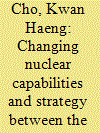

|
|
|
|
|
| Summary/Abstract |
Continuous development of North Korea’s nuclear capabilities and the
accompanying concern about the possible decoupling of the alliance between the
Republic of Korea (ROK) and the United States have produced numerous opinions
on what should be done about North Korea’s nuclear program. While there are
discussions on conceptual possibilities of deterrent or compellent use of nuclear
weapons by North Korea, these discussions often fall short of making specific
connections between the relational nuclear capabilities between North Korea
and the United States, and their nuclear strategies. Such connection is necessary
in grasping a clear picture of the nuclear security environment of the Korean
Peninsula, and formulating possible policy responses the ROK should adopt
as a result. This article seeks to make this connection by analyzing the nuclear
capabilities and strategy of North Korea and the United States. It argues that
North Korea will be able to pressure alliance decoupling only if it is able to field
submarine–based ballistic missiles with an inter-continental range. The ROK should
seek to avoid this outcome by strengthening its own deterrence measures against
North Korea, seeking assurances on the U.S. alliance commitment, and seeking
measures that could reverse North Korea’s potential second–strike capability.
|
|
|
|
|
|
|
|
|
|
|
|
|
|
|
|
| 2 |
ID:
192885
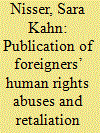

|
|
|
|
|
| Summary/Abstract |
Institutions that monitor violations of human rights, particularly of victims living outside their home countries, will often name the victims’ countries of origin in their reports. This article looks at this understudied practice and argues that it unintentionally creates bilateral retaliation dynamics between the victims’ home country and the country violating the victims’ rights. The article defines retaliation and explains why countries care about violations of their citizens’ rights that take place abroad. Through empirical analysis, the article shows that countries retaliate in response to violations of their citizens’ rights which have been identified and publicized by the UN Committee Against Torture. I use a new dyadic dataset on the abuse of foreigners’ human rights, as identified by Amnesty International and the Committee Against Torture, to test the hypothesis that a country's abuse of foreigners from a peer country is associated with that peer country's abuse of rights of citizens from the observed country. I then examine the Syrian–Lebanese case to trace the process of retaliation. These analyses support the hypothesis that countries retaliate against violations of their citizens’ rights abroad.
|
|
|
|
|
|
|
|
|
|
|
|
|
|
|
|
| 3 |
ID:
156894


|
|
|
|
|
| Summary/Abstract |
This article posits that the remnants of archaic sociocultural norms, particularly the honour-imposed custom of retaliation, play a crucial role in the process of insurgent engagement in Russia's autonomous republic of Dagestan. Through a series of interviews with former insurgents, this study outlines two retaliation-centred mechanisms: “individual retaliation” and “spiritual retaliation” in order to explain the microcosm of motives behind insurgent activity in Dagestan. In doing so, this study problematizes the role of Salafi/Jihadist ideology as the main impetus for insurgent violence. Reversing the traditional causal link between violence and religion, this study also demonstrates that the development of Jihadist ideology is a by-product of insurgent mobilization rather than its cause.
|
|
|
|
|
|
|
|
|
|
|
|
|
|
|
|
| 4 |
ID:
091616
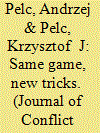

|
|
|
|
|
| Publication |
2009.
|
| Summary/Abstract |
The aim of this article is to distinguish between strategies in the Iterated Prisoner's Dilemma on the basis of their relative performance in a given population set. We first define a natural order on such strategies that disregards isolated disturbances, by using the limit of time-average payoffs. This order allows us to consider one strategy as strictly better than another in some population of strategies. We then determine a strategy-to be ''robust,'' if in any population consisting of copies of two types of strategies, itself and some other strategy - the strategy - is never worse than. We present a large class of such robust strategies. Strikingly, robustness can accommodate an arbitrary level of generosity, conditional on the strength of subsequent retaliation; and it does not require symmetric retaliation. Taken together, these findings allow us to design strategies that significantly lessen the problem of noise, without forsaking performance. Finally, we show that no strategy exhibits robustness in all population sets of three or more strategy types.
|
|
|
|
|
|
|
|
|
|
|
|
|
|
|
|
| 5 |
ID:
179104
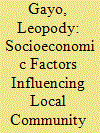

|
|
|
|
|
| Summary/Abstract |
We assessed the factors influencing local community perceptions towards lions in the Selous Game Reserve, Tanzania. Data were collected from 384 households through questionnaire surveys, interviews, and focus group discussions, and analyzed by content analysis and IBM SPSS version 20. About 86% (n=331) of respondents had negative perceptions towards lions. Education (p=0.0016, R=1.68), occupation (p=0.0021, R=−2.07), livestock numbers (p=0.0011, R=0.-0.43), livestock management (p=0.0006, R=0.373), water sources (p=0.0019, R=−0.21), and distance from the protected area (p=0.0183, R=2.11) were significant factors for community perceptions towards lions. We recommend compensation for the victims of lion attacks to reduce negative attitudes towards the species
|
|
|
|
|
|
|
|
|
|
|
|
|
|
|
|
| 6 |
ID:
072890
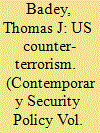

|
|
|
|
|
| Publication |
2006.
|
| Summary/Abstract |
Although both the Clinton and Bush administrations identified terrorism as a major national security threat, the Clinton administration focused on terrorism primarily as a law enforcement issue while the Bush administration approached terrorism as a military problem. This difference becomes readily apparent when the economic isolation, multilateral cooperation, resource allocation, and retaliation policies of both administrations are compared. Despite significant differences in their respective approaches to these policies, there has been a remarkable consistency in American counter-terrorism policy over the past decade. Fierce, partisan political debate has overshadowed these fundamental policy similarities. The development of American counter-terrorism policy after 9/11 was constrained by time factors as well as also institutional and political forces. Even in this, the most extreme challenge to American national security planning since the rise of the Cold War, bureaucratic institutions have proven themselves remarkably resilient.
|
|
|
|
|
|
|
|
|
|
|
|
|
|
|
|
| 7 |
ID:
193042


|
|
|
|
|
| Summary/Abstract |
This article is an empirical examination of ‘victimhood’ in the context of the widespread, deadly and destructive electoral violence that affected Zimbabwe in 2008. It contends that an examination of the behaviour of victims of state-sponsored political violence enhances our comprehension of ‘victimhood’ as a factor in the perpetuation of political violence. The victims were largely ignored by the justice system, the political leadership and the community, all of whom were under the coercive spell of the ruling Zimbabwe African National Union-Patriotic Front (ZANU PF). The trivialisation of their situation, and the absence of legitimate avenues for redress, forced many victims to seek direct revenge. The article traces how this fomented and reproduced the already violent political atmosphere in Norton town during the 2008 election period. It relies on interviews with opposition Movement for Democratic Change (MDC) victims of violence in Norton to consider how they attempted to make sense of their pain by claiming victimhood and exacting physical revenge against their tormentors.
|
|
|
|
|
|
|
|
|
|
|
|
|
|
|
|
|
|
|
|
|